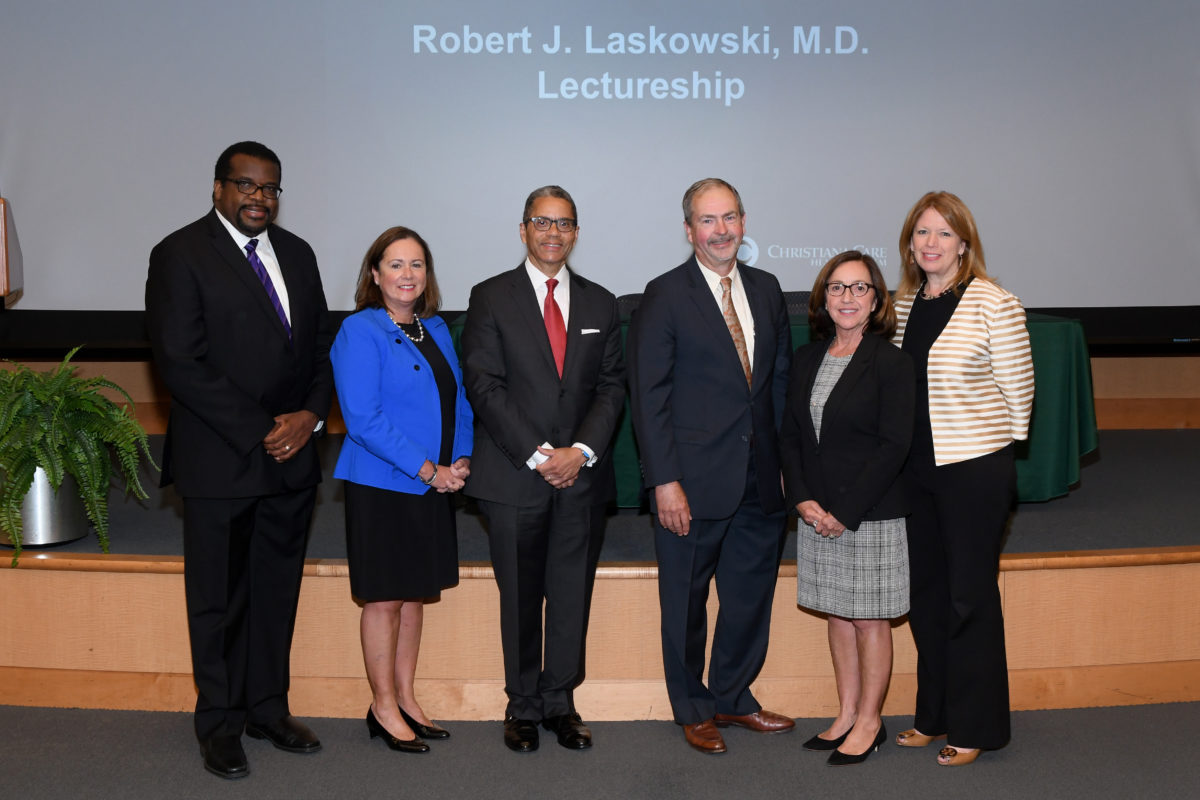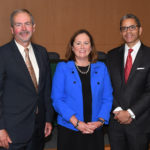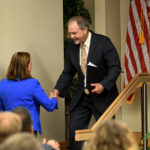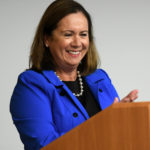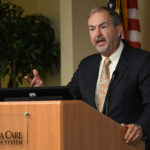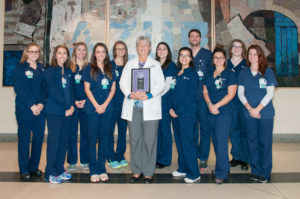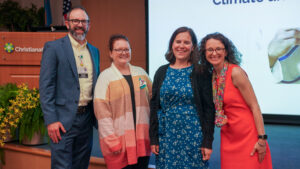Delivering on the promise of The Christiana Care Way means more than providing health care services, said Bruce Siegel, M.D., MPH, president and CEO of America’s Essential Hospitals, during the inaugural Robert J. Laskowski, M.D., Lecture Sept. 7 at Christiana Hospital.
It’s about being a partner in understanding and addressing the social determinants of health — access to fresh foods, safe places to live, play and work, secure employment and access to health and wellness services when and where people need them.
For example, childhood obesity is nearly twice as prevalent nationally among children in families with lower income compared to higher-income families, according to the U.S. Centers for Disease Control and Prevention. Obesity is a precursor to Type 2 diabetes, high blood pressure and heart disease and can be an indicator of barriers to good nutrition, access to health care and health education and socioeconomic resources. The costs are life-threatening. Closer to home, wealthier men in Wilmington live on average a decade longer than poorer men, Dr. Siegel said.
“Your ability to live a long and productive life shouldn’t be determined by the ZIP code you’re born in,” Dr. Siegel said. Addressing these social determinants of health is a health system’s mission — and a moral imperative, he said.
Christiana Care has long been on the path to root out health disparities. As president and CEO of Christiana Care from 2003 to 2014, Robert J. Laskowski, M.D., established The Christiana Care Way as the health system’s value-driven mission statement: “We serve our neighbors as respectful, expert, caring partners in their health. We do this by creating innovative, effective, affordable systems of care that our neighbors value.”
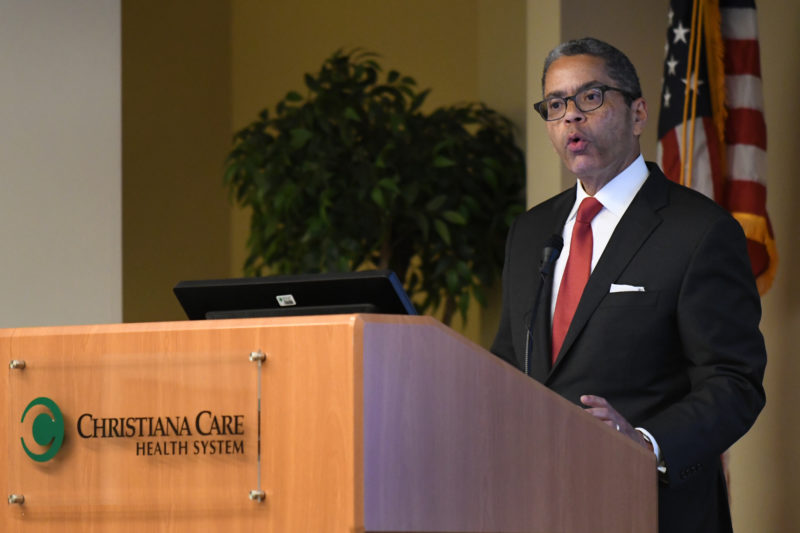
“By bringing innovative leaders like Dr. Siegel to Christiana Care to share their experiences, the Laskowski Lecture carries on its namesake’s dedication to building healthy communities through measurable, value-based care,” said Christiana Care President and CEO Janice E. Nevin, M.D., MPH.
The lectureship was made possible by generous gifts from many contributors, including the Junior Board of Christiana Care, Don and Ann Franceschini and Arkadi Kuhlmann.
“Value at Christiana Care, rooted in Bob’s visionary commitment, means making a measurable difference in the lives of patients and families in ways they appreciate and that they and society can afford,” Dr. Nevin said.
Dr. Siegel’s lecture on the social determinants of health speaks to how to achieve value, Dr. Laskowski said. Not to recognize the human context of health care delivery is to “risk being irrelevant and ineffective,” he said.
The social factors that affect health are called “determinants” for a reason: Research-based evidence shows that nonclinical considerations such as education, employment and food security play a larger role in health than medical care.
A 2014 policy brief in the journal Health Affairs reported on research that behavior and social circumstances were generally found to control at least half of health; medical care was thought to be responsible for no more than one-fifth of our health.
A common figure, cited in a 2014 report by the Robert Wood Johnson Foundation, is that 80 percent of a population’s health can be tied to social determinants.
It’s a key focus for America’s Essential Hospitals, a nonprofit organization that represents 325 institutions, including Christiana Care, that serve as a safety net for the most vulnerable members of their communities.
Essential Hospitals are distinguished by their drive to care for those with limited access. As of 2013, about half of hospital discharges and outpatient visits to member hospitals were for uninsured or Medicaid patients.
Member hospitals also advance public health and health equity, which leads them to re-think how they define their communities and identify their communities’ needs to enable them to achieve optimal health.
“That shift, and you’re on that journey, is a huge one,” Dr. Siegel said. “It broadens your responsibility to the entire community.”
Population health’s new paradigm
Health care systems have the leverage and public trust to take a leadership role in reversing social inequities that lead to poor health, Dr. Siegel said.
Yet the shift to seeing non-medical problems as central to medicine won’t come without uncomfortable conversations, he said. He called on health systems to take positions on issues well outside their comfort zone, such as land use, housing and the minimum wage.
A health system that cannot find its voice on these issues “will fail at equity and fail its patients,” he said.
Though health inequities are the result of accumulated decades of social inequality, hospitals are well-positioned to lead coalitions to combat them, he said. Christiana Care, for example, is the largest private employer in Delaware. Health systems define “the landscape and built environment of an entire region,” Dr. Siegel said.
He credited the medical sector with speaking up against the effort to repeal the Affordable Care Act, saying that advocacy sprang from a “truly American sense of justice and community.”
The shift from focusing on volume of care to value of care, supported by the Affordable Care Act, is something of a stepping stone to tackling social determinants of health, he said. If coordinating care requires breaking down barriers within a health system, the next step will be to break down the barriers between a hospital and its community.
Dr. Siegel said The Christiana Care Way, with its focus on respectful, expert service in partnership with its neighbors, puts the health system “on the path to achieving equity and eliminating inequity.”
An expanding definition of community
After Dr. Siegel’s lecture, he was joined on a panel by three population health experts: LeRoi Hicks, M.D., MPH, FACP, the Hugh R. Sharp Jr. Chair of Medicine at Christiana Care; Lolita Lopez, FACHE, president and CEO of Westside Family Healthcare; and Bettina Tweardy Riveros, Esq., chief health equity officer at Christiana Care.
Dr. Nevin had a simple question for the panel: For the purposes of population health, what is a community?
Dr. Siegel said there are different definitions; many hospitals include only those with whom they have a medical relationship, while others define it as a geographic area. Some take the next step, to claim stewardship over their entire state.
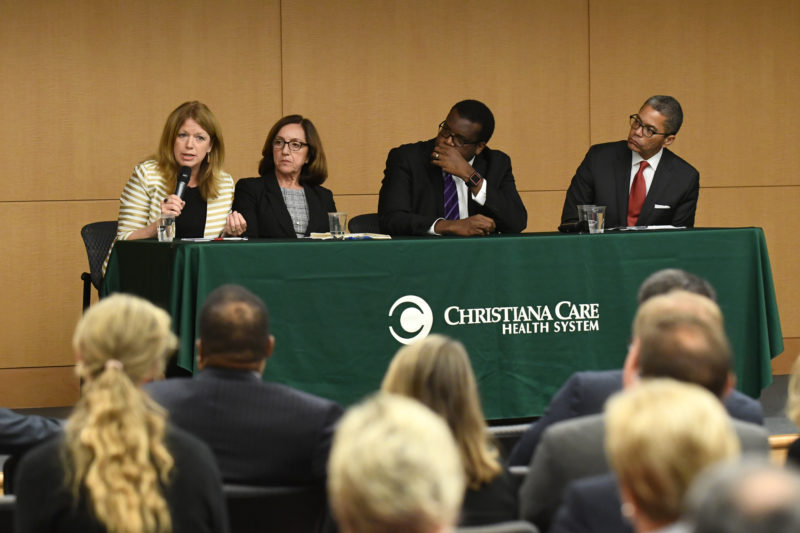
His response touched off a discussion on how to serve that wider community. Dr. Hicks said Christiana Care has become proficient at implementing optimal medical therapies, but he would like that to be complemented by a social and behavioral profile tailored to each patient.
For example, he’d like to know if a patient could use a referral for nutrition assistance or help purchasing medication. He told the story of a recent patient who was admitted to the hospital four times in the past year, most recently for heart failure. The woman was hospitalized in part because her diet had recently veered toward high-sodium fare — TV dinners and other processed foods — due to the work-related absence of her son and caregiver.
Collaboration is already making a difference, said Lopez. She highlighted a new program at Westside Family Healthcare, a long-time partner with Christiana Care, to train the health system’s family medicine residents in Westside’s Wilmington clinic. Working full-time with low-income patients helps providers “really live the experience around the social determinants of health,” Lopez said.
Riveros spoke of Christiana Care’s efforts to build a workforce that reflects its community, saying a more diverse staff leads to more culturally appropriate clinical care and outreach.
“When we have diverse workforce and a very inclusive environment, it makes us stronger. It makes us better … We can drive toward improvement, drive toward being exceptional today and better tomorrow. It’s also more effective when we’re caring for our community — we can better understand their needs from a cultural competence perspective, cultural differences and how we can best respond clinically to care for our diverse community.”
After touring Christiana Care, hearing about the commitment of its leaders and learning about its care coordination efforts, including the health system’s unique care coordination program, Dr. Siegel said he’s seeing progress in addressing the social determinants of health.
“From what I’ve seen here in the past two days, I’m confident you’ll rise to that challenge.”
